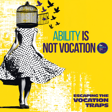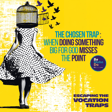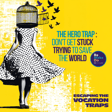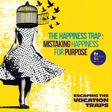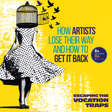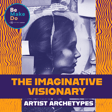Become a Creator today!Start creating today - Share your story with the world!
Start for free
00:00:00
00:00:01

The Security Trap: Why External Validation Isn’t Your Calling
Episode Overview:
"Those of us who find ourselves overly concerned with getting it right or being good, might find ourselves trapped in a net of other people's expectations and just getting tangled into a good old mess."
Do you ever feel like your worth depends on applause, success, or being “useful” to others? You might be stuck in the Security Trap—a subtle but powerful mindset that confuses validation with vocation. If you’ve ever felt guilty pursuing your creative work—or unsure if it “matters”—this episode will help you untangle your calling from the need to please.
Up Next:
The Happiness Trap – Discover why chasing good vibes and “living your best life” can sabotage your vocation—and how to find joy beyond the high points.
Resources for Artists:
- Download your FREE Vocation Trap Tracker: https://soul-makers.kit.com/traptracker
- Discover Your Artist Archetype → Take the Free Quiz at soulmakers.org
- Download the Full Artist Archetypes Guide for deeper insight: www.soulmakers.org/bemakedo
- Read Samuel Wells' book, Improvisation: The Drama of Christian Ethics
- Read the article, Vocation's Unbroken Chain: Biblical Call Stories and the
Experience of Vocation by Chris Keeton - Read the article, Understanding Vocation: Discerning and Responding to God's Call by Don Thompson
Connect & Share:
- Subscribe to Be. Make. Do. to follow the full Vocation Traps series
- Share this episode with friends, mentors, or artists in your life
- Tag us and join the conversation on socials using #VocationTrapsPodcast
- Join our brand new Instagram Broadcast Channel!
Transcript
Introduction to The Security Trap
00:00:00
Speaker
Do you ever feel like your worth depends on applause, success, or being useful? Well, welcome to The Security Trap. In this episode, we unpack how people-pleasing and performance can masquerade as purpose, and how artists can break free from the need for validation to reconnect with true vocation.
Podcast Focus: Arts and Spiritual Wholeness
00:00:28
Speaker
Hello, welcome back to Be Make Do, a Soulmakers podcast, where we explore what it takes to live out your call in the arts with spiritual wholeness and creative freedom. I'm your host, Lisa Smith, here with my producer, Dan ABH.
00:00:42
Speaker
Hello, everyone. And it's our passion to encourage you to become who you were created to be, make what you were created to make, and do what you were created to do.
Overview of Vocation Traps
00:00:54
Speaker
So in our introduction episode, we unveiled the idea of what we call the vocation traps, those sneaky mindset detours that can derail your sense of purpose.
00:01:05
Speaker
Those traps we've labeled the security trap, where applause feels like purpose, the happiness trap, where chasing good vibes leaves you empty, the hero trap, where saving the world becomes your burden, the chosen trap, where doing big things for God can get you burned out.
00:01:23
Speaker
In this episode, we start our quest by examining the security trap and finding ways to help you get unstuck and experience a greater sense of freedom and your creative endeavors and your sense of call.
Lisa's Personal Journey with Vocation Traps
00:01:34
Speaker
Of course, we don't have it all figured out, but it's something that we've been exploring and working with for a long time. We are just artists and creatives just like you who've been on this path exploring these questions.
00:01:47
Speaker
These questions about vocation have been something that have been with me my whole life, and I've gotten stuck in every single one of these traps. So in my quest to kind of get myself unstuck, I've learned a lot of really great stuff and come across a lot of great materials, had really wonderful advice from friends and other artists, and also had the opportunity to work with creatives across disciplines as they're struggling with their own version of the traps.
Tools for Overcoming Vocation Traps
00:02:17
Speaker
So if you ever feel like you're trying to escape a twisted net of other people's expectations, you're going to want to listen closely to this episode. Let's get started. Let's do it.
00:02:36
Speaker
Okay, first things first, I want to be sure you take advantage of our vocation trap tracker tool that we created so you can track along with us as we explore these vocation traps this season.
00:02:48
Speaker
It's a really cool, highly interactive tool that you download. There's spaces to color in stuff like mind maps, places for journaling, all kinds of great exercises.
00:02:59
Speaker
There's something that happens when you just take a pen or some crayons or some markers and a piece of paper and just let yourself go. so it's a great tool to be able to process if any of these traps are getting you stuck, but also to figure out the ways to bust through so that you can find freedom.
Dependency on Approval: The Security Trap
00:03:18
Speaker
You can find the tracker and the workbook on our website at soulmakers.org slash be make do, or you can find the link in the show notes.
00:03:34
Speaker
All right, so what is the security trap? Now, each of these traps, we're gonna kick off with a question, because it's kind of, I'm all about questions. And so these are the questions that we tend to ask ourselves without even thinking.
00:03:48
Speaker
And then I'm proposing that we kind of switch those questions up a little bit, or switch them up for better questions. So the question that we find ourselves asking in the security trap is, what am I called to do for others?
00:04:04
Speaker
So now the security trap lures you in with promises of validation. It traps you when you begin to mistake that validation for purpose.
00:04:15
Speaker
Now we're going to go right back to that question. What am I called to do for others? Now that that sounds actually really noble because doesn't being focused on others make me a good person? Isn't that what we're supposed to be doing is serving others?
00:04:28
Speaker
But see, the trick of the security trap is that instead of staying focused on God and what we're called to do on doing the daily things, we're keeping one eye on other people's ah approval for the security of knowing that we're doing the right thing.
00:04:46
Speaker
So it's different than being about serving. It's about looking to others to make sure that I'm okay. Another way to say it is that those of us who find ourselves overly concerned with getting it right or being good might find ourselves trapped in a net of other people's expectations and just getting tangled into a good old mess.
00:05:10
Speaker
Yeah, you mentioned that the trap feels noble. And I'm wondering if you could talk a little bit more of why artists in particular usually fall into this trap because they really want to help out or serve or be a good person or or something like that.
00:05:28
Speaker
Asking for a friend.
00:05:31
Speaker
So I'm not sure that this is necessarily particular to artists specifically, but I i think it has more to do with personality type. But I do think as Christians, this can become a factor or as people who are really motivated by helping others or doing things for others, because obviously within that framework, service is good. That is what we are called to. We're called to develop our gifts and We're called to develop our relationship with God and our identity with God, and then that needs to be outwardly focused to be able to serve other people.
00:06:03
Speaker
But where it becomes problematic, the difference, is that we are looking for external validation. It's not really about the other person. We're looking to the other person to validate ourselves. We're taking our eyes off of God.
00:06:18
Speaker
for identity and purpose. So yeah, I think this can apply to ah to anybody, but I think it's important for artists to consider because maybe we're not even necessarily aware or clued in that that's part of the factor for us So let's go
Identifying Signs of the Security Trap
00:06:35
Speaker
into that then. How do we know if maybe you're in the security trap?
00:06:40
Speaker
So when you're making a decision about your career or what you're going to make or what you're going to focus on, do you ever find yourself stopping to wonder what's expected of you?
00:06:53
Speaker
you ever ask, what other people say I should do? That might be a clue. Or when you get an idea for a creative project, are you ever tempted to fall back on the abilities that come easily and naturally instead of taking the time or spending the money to develop a new skill?
00:07:09
Speaker
Maybe you feel like you you're ready to move to another level or you need to add something um in order to achieve the vision you have, but you kind of hold back because you don't know if you should spend the money to learn how to do that thing or spend the time to develop that skill.
00:07:27
Speaker
Or do you ever feel guilty about taking too much time in the studio just in general? Or like I said, buying new equipment that you need? Or maybe feel guilty about being on tour instead of doing something that's more stable and has more of a stable income?
00:07:43
Speaker
Here's another one. so This is putting this specifically into that Christian category. I do come across this, especially with younger artists, um maybe who are just starting out or graduating from college, asking themselves, should I do music ministry or art ministry or drama ministry or something of the like? Because there's a voice inside you that's telling you that would be more worthwhile than pursuing just music or art or drama or some other creative discipline.
00:08:13
Speaker
And so an outside the mold creative impulse is staying buried inside of you. Okay, here's one more. When you feel pressured by limited time, energy, or resources, do you lean toward what's sure to be rewarded with affirmation and security?
00:08:30
Speaker
Or do you find it difficult to make choices or risks that aren't a sure thing and may disappoint or let down others around you? You start to see kind of there's a little bit of a theme going on here.
00:08:41
Speaker
Obviously, considering others for whom we are genuinely responsible is important. I'm no way saying that you shouldn't honor your commitments. But there are other voices that maybe we're sometimes looking to for security of approval, voices we aren't actually responsible for.
Impact of External Expectations on Personal Growth
00:09:02
Speaker
So you have to ask if taking on a responsibility for meeting others' expectations might actually be a way to avoid taking responsibility for the care and development of your own gifts.
00:09:14
Speaker
That's how you get stuck. It seems outwardly focused, but it's possible you're actually focused on serving others for your own needs, not in service to true calling.
00:09:25
Speaker
See, it's kind of a little little insidious jump there. Hey, Lisa, can I ask you something? Absolutely. Regarding those differences between genuine responsibilities and voices that you're not actually responsible for, asking for friend,
00:09:42
Speaker
we asking for her friend discern between the two when making a massive decision, like a career change or creative changes or joining a different band or leaving another band or taking on a play, but you have all these other things and these voices in your head. like How do you discern?
00:10:02
Speaker
Right, right. Well, so the differentiation between... legitimate responsibilities, genuine responsibilities, and responsibilities that you're taking on from external sources is when you're talking about genuine responsibilities, they're like people that are legitimately dependent on you, like children or spouse or somebody who is dependent on you that you've chosen to take care of or
00:10:33
Speaker
the decisions that you will make will legitimately impact them in some way. And um and then you need to be thoughtful and considerate around that. the That's one thing.
00:10:45
Speaker
Making decisions based on responsibilities that other people are putting on you or you're actually taking on yourself based on ideas of success or fame or status or material success or what it means to be a responsible person, what it means to be ah yeah a grown-up. you know i think these things,
Responsibilities vs. Societal Expectations
00:11:08
Speaker
especially for artists, come in. like As a freelancer, you are not going to have a steady income where you can say, this is how much I'm going to earn this year and this is what this is going to look like.
00:11:18
Speaker
It's a big risk. So yeah, taking that risk, you need to take into consideration, are you going to be able to pay your bills? Are you going to be able to live up to the responsibilities that you have? But you don't have a responsibility to be a certain type of person.
00:11:33
Speaker
You don't have a responsibility to somebody to make a certain amount or live a certain way or your life to look a certain way. Does that make sense? like it's It's not taking on these responsibilities that might come from you know parental expectations, or even peer expectations of yeah you know what it looks like to be successful. you know what It's about choosing your values.
00:11:57
Speaker
It goes back to everything we talk about. Your values based on what motivates you, based on who God created you to be, and being faithful with that as opposed to looking over to your neighbor.
00:12:08
Speaker
And saying, you know, you should be on tour all the time, or you should never go on tour, or you should, you know, whatever that is. It's looking to external factors to make decisions about your values.
00:12:24
Speaker
And it's so it's looking in the wrong place. Yeah. Yeah, I think another thing that happens too for me is that I hear voices from so long ago that still creep up in my head. You know what I mean? Like yes like a long time ago.
00:12:39
Speaker
Yes. I think that's so common. Yeah, me too. Me too. and then And it's funny because sometimes those voices have taken on a life of their own. If you went back and actually talked to the person or the people or whatever, they wouldn't say that at all.
00:12:53
Speaker
It's just that we've taken that and and like hugged onto it so much to say, okay, this is how I will know. if I've grown up. This is how I will know if I'm doing it right. This is how I will know if I'm okay.
00:13:04
Speaker
But then what if where you're feeling led, where your creative drive is taking you, where God is taking you, is in a different direction that's in opposition to that? That's when this becomes a trap because you get stuck not being able to move forward because you're holding onto this thing that a lot of times we're not even really aware that we're holding on to, which is why we're doing this, right?
Risks and Artistic Growth
00:13:28
Speaker
And so that that really takes us into why the security trap is so dangerous.
00:13:34
Speaker
Because getting tangled in that safety net what we think is a safety net, can actually give us a great excuse to avoid risk, which stifles the freedom to make mistakes and to grow, which is unavoidable for people in general, but certainly unavoidable for creatives and artists.
00:13:55
Speaker
Because if we avoid those mistakes, if we make the possibility of making mistakes, we avoid the growth, and that means that ultimately... We are not able to develop our abilities to their fullest or maybe move beyond whatever just naturally good at to things that we've never even considered, that God is waiting for us, that wants to blow our minds and bless all kinds of people.
00:14:20
Speaker
It's just like when we've got one eye on the audience, we get the benefit of avoiding negative criticism if we're just kind of performing to do what what they want. But we're missing out on getting to see what we're really capable of and sharing that with others.
00:14:36
Speaker
See, the danger is that what comes easily or wins the approval of others may not necessarily lead us into becoming who we were created to be.
00:14:47
Speaker
And it can impede the development of those skills that we need to make what we were created to make, which leaves us unprepared to do what we were created to do, right? So this is this is the big be, make, do foundation.
00:15:01
Speaker
In this space of of exploring making what you were created to make, we have to understand that calling often requires the development of skills and talents that stretch us. And that that can take a long time with regular, boring practice to get there.
00:15:20
Speaker
I remember when I was in high school, I took oboe, ah basically because nobody else did, and i I just felt like that would give me special attention. Yeah. took it. But I never practiced. I hated practicing. I couldn't make a good sound.
00:15:33
Speaker
And I never, ever practiced. And um I actually, i there was a ah concert that I went up there and I broke my reed within the first minute. When I lifted up the instrument, the reed cracked against the ah music stand.
00:15:48
Speaker
And so I played the whole concert just pretending I was playing. And the director of the um orchestra after the concert said, wow, Lisa, that was the best you'd ever played. So So regular practice is something that is a commitment that you know moves you from not being able to play to play.
00:16:06
Speaker
That's not fun, but that's an important piece of of what you have to do, obviously. And we can go through lots of seasons where it looks like we're not accomplishing anything to the outside. Right.
00:16:17
Speaker
Other people. we've certainly I've certainly been in that space a lot. When you have a new idea that you're working on, that you're working out, That you're developing and everyone around you is going like, there's five people that are involved with what you're doing. is is this going anywhere?
00:16:34
Speaker
And I can't pay attention to the external voices because it just takes a long time being in that space to then be able to grow into what it needs to be. So we have to be comfortable being in these seasons where maybe it looks like we've even just like completely washed out.
00:16:51
Speaker
Or we have to sacrifice comfort and success to achieve our goals. But true success and faithfulness can only come through risk. And risk requires learning to accept failure, rejection, and the humility of imperfection as a normal life.
00:17:08
Speaker
part of life. And that is so hard. we've We've had here a motto since the very beginning, failure is an option. And I have to be reminded of that all the time because it's so easy for me to get sucked into those feelings of a failure because it's not producing immediate success. And I know like if I did this, this, and this,
00:17:34
Speaker
this This would blossom into something else that would look, quote unquote, more successful, but it's not the thing that I'm really being called to. So it's a real tempter.
00:17:45
Speaker
Yeah. Yeah. I think that there is a fear of maybe negative criticism that really, really does prevent artists from like fully exploring their craft or their gift or their art.
00:18:00
Speaker
I see this so much in the music land that I've lived in for so many years. And even currently, like i fall into this trap. I definitely have a fear of criticism when you're in the studio. I mean, you you know, I've been working on this new record for months.
00:18:19
Speaker
I've discussed this before with with you and and even my band about future tripping. This idea of future tripping. And future tripping is basically fear. You what I mean? It's like this bubble of fear.
00:18:32
Speaker
And I really do think that really does prevent you from taking risk. I think it also prevents you from making really, really good work.
00:18:44
Speaker
You know what i mean? Because at that point, if you're sort of like paralyzed by this fear that people aren't going to like what you're doing, you basically begin to make things that are what everybody else is doing.
00:18:58
Speaker
because we live in the trend world. So the trend world is that this music from two years ago, it genre isn't really relevant anymore. So let's change our genre to to sort of fit with this. And my my my my perspective on this, especially with my band Flower Bomb, is like, let's take all the things that influence us and make it our own.
00:19:22
Speaker
And if it has a little bit of this and a little bit of that and a little bit of this, but we don't need to wean all the way over here just because... everybody else is doing this type of thing. Because what happens is that, and this might be controversial to say, but it basically borders on plagiarism.
00:19:38
Speaker
Because you're basically doing exactly what others are doing because you don't wanna take that risk because you have this fear of this negative criticism. yeah But you're the one that's thinking of the negative criticism.
00:19:51
Speaker
yeah Again, my friend told me this, okay? It's just nothing you relate to at all. Nothing than I relate to at all. Yeah, I think of the the flip side of that, which I've heard a lot of bands, especially bands who make it you know who have a really large following, when they creatively are kind of done with what they've been doing and they need to grow into something else.
00:20:13
Speaker
And then there's that fear of if we start making something that's different than what our fans wanted, we're going to lose all of our fans. We're going to lose all of our opportunities. Like the whole thing is just going to go away.
00:20:24
Speaker
Like that takes a lot of guts to move into that space. Yeah. And that makes me think about Andre 3000 from Outkast. It's just fascinating to see this guy go from major hip hop success to kind of putting that aside so that he can focus on the flute yeah and like really exotic flutes and just sort of playing. And then that leads into jazz and all kinds of other things. But I mean, he he received major, i didn't even know if it was criticism. It was more like, what are you doing?
00:20:55
Speaker
Don't do this. Don't, don't do it. you know But he he was his attitude was just sort of like, it's that's not if I'm not creatively engaged, then um I'm out.
00:21:05
Speaker
like There's no other reason for me to be doing this. right So it takes a lot of courage, but I also think it it takes a connection to your motivation and having a strong sense of your identity and who you are.
00:21:18
Speaker
That you're not, again, you're not looking externally for that sense of validation.
Growth Through Hardships
00:21:23
Speaker
But those who've been there know that it's usually those seasons of hardship that force us outside and beyond ourselves to who we need to become.
00:21:33
Speaker
Yeah. I think this is such a good example of like when God's formation happens, that it does happen through circumstances that maybe we didn't choose ourselves. And we see this all the time.
00:21:45
Speaker
Yeah. It's that thing of like, if I had given up at this moment, I never would have seen the fruit. you know it's it's We do have a sense of... um I think fear of insecurity, right? Of things not being okay, that that's the end. But rather than seeing those setbacks as an opportunity to learn and grow and be shaped in a new way, which God always does if we ask for God to take whatever circumstance we're in and use it as an opportunity to grow us, to mature us, or help us to be more faithful, He always does.
00:22:23
Speaker
He always does. Just a little sermon for you, there you go. Thank you for that. Yes, I know you need It's for my friend.
00:22:34
Speaker
For your friend, yes. I know your friend needs that. So, okay, so we've talked about the security trap, we talked about the fact that it's common, it's in the Bible, and it doesn't need to be something that gets us stuck forever.
00:22:47
Speaker
But in order to escape it, we have to look at what's behind it so we can make that mindset shift and untangle ourselves from this so-called safety net. The security trap is filled with those struggling with a tug-of-war conflict between external messaging and our own inner knowing.
00:23:06
Speaker
Overcommitment to productivity and self-sacrifice can often hide the real motivating fears hiding just below the surface. So we might be subconsciously trapped by fears of stereotypes or the influence of parents or authority figures, or maybe there's even trauma that has to be healed.
00:23:25
Speaker
This is where a disciplined self-knowledge comes in, which is one of our seven principles in the Soulmakers curriculum, and it's so important. because it takes courage to have an honest look at our deeply rooted values.
00:23:39
Speaker
Maybe we've internalized the idea that material success is essential, or maybe we're driven by competition or productivity or self-sufficiency or individualism or whatever it is.
00:23:51
Speaker
Worst of all, in the security trap, we're in danger of being distracted from our call because it makes us think that we're sacrificing our deeper longings for something better.
00:24:02
Speaker
for a good cause. It convinces us that doing for others and productivity is enough.
Fears and Risk-taking
00:24:10
Speaker
So ask yourself, in the back of your mind, do you find yourself returning to any of these questions?
00:24:16
Speaker
What if others don't see value in what I do? What does it even matter if I make art? Or what will people say if I make this choice?
00:24:27
Speaker
Or what if I do this and I end up being alone and I lose all my fans and I lose all my friends and I lose all my collaborators and I lose all my support? Or what if I'm just being selfish?
00:24:39
Speaker
What if I just want to do this for me? The truth is these fears don't keep you humble. They keep you from taking appropriate risks, working hard to develop skills and gifts that don't come easily, and doing the soul work to develop discernment for yourself.
00:24:58
Speaker
But overcoming these obstacles are often the very things that shape and mature us into what God created us to be and prepare us for what we're called to do. So what do you think, Dan, out of all those questions, what do you see the most often?
00:25:13
Speaker
What I see the most often is what will people say? yeah I think for me and my peers and the market that we're in, I think that what will people say is is the most distracting one.
00:25:31
Speaker
Yeah, it's huge. At the end of the day, you're sort of like giving what you're working on, whether that's ah a social media post about something that you're doing, playing a show, putting out a single, doing a record, ah BTS thing or anything, you know, and and there's still a fear of like putting that out and being like, is this even is this even going to do anything?
00:25:53
Speaker
And then another question I ask is like, why do we even have to do this? Yeah. Yeah. Are you even doing some of those things for or what other people say you should do? Yeah.
00:26:03
Speaker
I'm always thinking about how do i how do we reinvent the wheel? you know Yeah. but But I think what will people say is that one definitely distracts me.
00:26:14
Speaker
Yeah, we're all hit by that one. And another one that I just see i hear a lot, i and i I hear it specifically within Christian circles, is like, with so much stuff going on in the world, with so much need, with so many things that I could be doing to help in this cause or the other, why does it even matter if I make art?
00:26:33
Speaker
like Am I just being selfish by taking this time or spending this money or whatever? And those are great questions to ask, but you have to ask yourself first, where is that message even coming from? Where are you getting the idea that it's selfish to use the gifts that God created you to make? you know And go back and listen to some previous ah episodes if you want to think about why matters that you make art, because it does matter.
00:26:58
Speaker
So yeah, all of these, depending on your personality and where you are and what messages you've absorbed personally, that net can grab you. But it's that safety net. It's wanting to have the safety net of knowing I'm doing the right thing instead of kind of walking on that high wire without the net and saying, I'm going to take the risk to go where I feel called to go where i where my creative impulses are are leading me because I'm secure in who I am as a person.
00:27:27
Speaker
in in Christ. And so i have the I have the security to take those risks and and find out and to grow and develop. So this all requires a mindset shift.
00:27:44
Speaker
So if you go back to the framework we were talking about in the introductory episode, you remember we were talking about um that we are not the star of a one-act play or even the hero of the show.
00:27:57
Speaker
we're in a ah We're in act four of God's five-act narrative, we're where we're invited to improvise, joyfully focusing on the abundance we can share rather than getting it right in an atmosphere of scarcity.
00:28:11
Speaker
Because we have so much freedom to explore and grow when we trust God's provision. When we don't need to meet somebody else's standards and are only looking to the God who loves us and delights in our use of His gifts— all these gifts that He's given us, we experience a security that we've never known before and a joy of life that was off limits when we were stuck in that security trap.
Mindset Shift for True Calling
00:28:39
Speaker
So let's revisit the helpful questions of a biblical framework of call. So instead of getting tied up in all those other questions, we can get into a dance of curiosity and wonder and asking, who is God?
00:28:51
Speaker
What does God love? And how can I align my loves with God's loves? And most specifically to this question, How can I live my life and what can I do with my creative work now, in my current circumstances, with my gifts and talents, with my motivations, with my interests?
00:29:15
Speaker
How can I use all of that in in concert with what God is doing in the world and in anticipation of the fulfillment of God's promises?
00:29:27
Speaker
So I really, i want to encourage you. i i revisit this trap all the time. It's so easy for all of us, like Dan and you and I have been talking about, that it's so easy to get distracted by what other people say. So it's it's common, but that's part of the process.
00:29:46
Speaker
So if you feel like you're in this trap or you feel like you get stuck in this trap, just try to remind yourself that the process of of of walking through call and development is slow.
00:29:58
Speaker
It does unfold over time and there are layers of developing maturity and growth. And honestly, it it ah It often leads us into those seasons where we feel unseen and misunderstood and out of sync with ah what others expect of us.
00:30:16
Speaker
Actually, when you're in that space, you can kind of be happy and know, oh, okay, I'm in this like level up mode. where I have the opportunity to grow into the next phase of my call. It's a chance. And I find that the more that I risk relying on God and going into that place, it almost becomes addictive because you you go to the other side and you have a different sensibility and a different sense of yourself and a different sense of what's possible.
00:30:45
Speaker
And you are able to do do more, be more of of who you were created to be. So just remember when you're in those spaces where things are not going right, don't seem right, people aren't resonating with what you're what you're doing or you're feeling condemned in some way because you're not meeting those expectations.
00:31:06
Speaker
it That space is not failure. It's spiritual formation. So that's the time to really sink in, really spend time with God, really learn to trust, and keep going.
Conclusion and Next Episode Preview
00:31:23
Speaker
Don't give up. So next time, we're going to dig into the happiness trap. We're going to explore what happens when vocation becomes about living the good life.
00:31:35
Speaker
Now, if what we're talking about is resonating with you, i want you to share it with a friend, leave a review, subscribe, or just come back next time. Thanks for listening. See you next time. Thanks for listening to this episode of Be Make Do.
00:31:49
Speaker
If you found value here, the single best way to support is to simply hit follow on your podcast app and leave a quick review and rating. It truly helps other soul makers find our community and it means the world to us.
00:32:01
Speaker
All links for this episode are in our show notes. See you next time as we break down the happiness trap.
